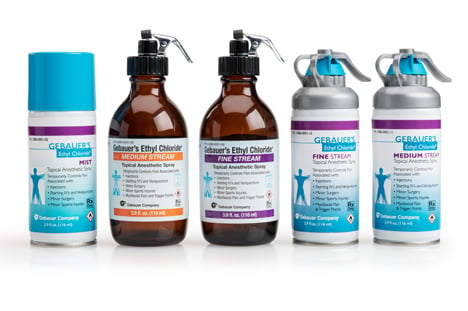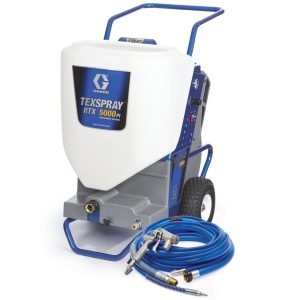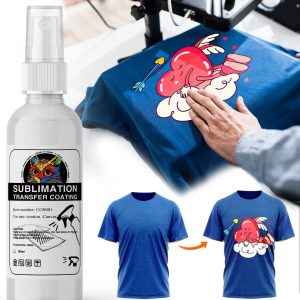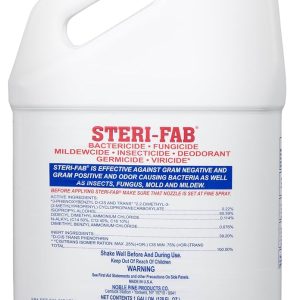
Ethyl chloride spray has become an essential tool in modern medical practice, offering healthcare professionals and patients a fast-acting, effective solution for pain management during various procedures. This topical anesthetic spray provides immediate relief through its unique vapocoolant properties, making it invaluable for everything from routine injections to minor surgical procedures.
What is Ethyl Chloride Spray?
Gebauer’s Ethyl Chloride skin refrigerant is a topical anesthetic that is sprayed on the skin to produce a local freezing effect. It works by depressing the nerve endings in the skin, which reduces the feeling of pain. It is a colorless liquid that is sprayed on the skin in a fine mist. The ethyl chloride spray mechanism of action involves rapid evaporation that creates an immediate cooling effect on the skin surface.
The chemical compound ethyl chloride (also known as chloroethane) functions as a vapocoolant anesthetic, meaning it cools the skin rapidly upon application. When applied to the skin surface with aerosol, its rapid evaporation causes tissue cooling down to −20 °C, resulting in the insensitivity of peripheral nerves. This dramatic temperature reduction temporarily blocks nerve impulses, providing effective pain relief for various medical applications.
The ethyl chloride spray formulation is designed for single-use applications, ensuring hygiene and preventing cross-contamination between patients. Healthcare professionals appreciate its convenience and reliability, as it requires no preparation time and provides consistent results across different patient populations.
Medical Applications of Ethyl Chloride Spray
Injection and Venipuncture Pain Management
Gebauer’s Ethyl Chloride® instant topical anesthetic spray (vapocoolant) is FDA cleared to temporarily control the pain associated with injections, starting IV’s and venipuncture, minor surgical procedures and minor sports injuries. The ethyl chloride spray has proven particularly effective in reducing patient anxiety and discomfort during routine medical procedures.
Healthcare providers commonly use ethyl chloride spray before administering vaccines, drawing blood samples, or inserting intravenous lines. The spray’s rapid onset of action makes it ideal for pediatric patients who may be fearful of needles, as well as adults with needle phobia or low pain tolerance.
Research has demonstrated that ethyl chloride spray significantly reduces pain perception during venipuncture procedures. Pain relief is considered to be a human right. In addition to local anaesthetic agents, there are some topical vapocoolant sprays such as ethyl chloride, and fluorohydrocarbons which produce immediate anaesthesia on the skin applied over. This application has revolutionized patient comfort during routine medical procedures.
Minor Surgical Procedures
Ethyl chloride is used as a local anesthetic in minor operative procedures such as incision of carbuncles or furuncles and removal of localized growths. The usefulness of ethyl chloride is limited in surgical procedures, however, because the anesthesia is of very short duration and thawing begins immediately after application.
The ethyl chloride spray provides sufficient anesthesia for procedures requiring brief pain relief, including:
- Skin biopsies and lesion removal
- Suture removal
- Wound cleaning and debridement
- Cryotherapy applications
- Wart removal procedures
Medical professionals value ethyl chloride spray for its immediate effectiveness and minimal side effects when used appropriately. The spray’s short duration of action makes it unsuitable for lengthy procedures but perfect for quick interventions where immediate pain relief is needed.
Sports Medicine and Athletic Injuries
This medication is used to prevent pain caused by injections and minor surgical procedures. It is also used for the temporary relief of minor sports injuries. Ethyl chloride also helps to relieve deep muscle pain when used with muscle stretching techniques. Athletic trainers and sports medicine professionals rely on ethyl chloride spray as part of their immediate injury management protocols.
The ethyl chloride spray applications in sports medicine include:
- Acute muscle strain relief
- Contusion and bruise management
- Pre-stretching muscle preparation
- Joint mobilization procedures
- Trigger point therapy
When combined with proper stretching techniques and physical therapy interventions, ethyl chloride spray enhances treatment effectiveness by temporarily numbing pain receptors, allowing for more comfortable therapeutic interventions.
How Ethyl Chloride Spray Works
Mechanism of Action
Ethyl chloride acts as a vapocoolant (cooling) anesthetic. When sprayed onto the skin, it rapidly evaporates, causing a significant drop in temperature in the targeted area. This cooling effect temporarily disrupts nerve conduction by decreasing nerve impulse propagation, resulting in localized anesthesia.
The ethyl chloride spray works through several physiological mechanisms:
- Rapid Evaporation: The liquid ethyl chloride immediately transforms into vapor upon contact with skin
- Temperature Reduction: Skin temperature drops significantly within seconds of application
- Nerve Conduction Blockade: Cold temperatures temporarily slow or stop nerve impulse transmission
- Pain Signal Interruption: The cooling effect prevents pain signals from reaching the brain
Duration and Onset
A 10-second spray of ethyl chloride to the skin results in local anesthesia for approximately 30 seconds. This brief but effective duration makes ethyl chloride spray ideal for quick procedures where immediate pain relief is required.
The ethyl chloride spray timeline follows a predictable pattern:
- 0-5 seconds: Initial cooling sensation begins
- 5-10 seconds: Maximum cooling effect achieved
- 10-30 seconds: Peak anesthetic effect maintained
- 30-60 seconds: Gradual return to normal sensation
- 60+ seconds: Complete sensation recovery
Safety Considerations and Precautions
Proper Application Techniques
Safe use of ethyl chloride spray requires adherence to specific application guidelines to prevent adverse effects and ensure optimal results. Have the patient assume a comfortable position. Take precautions to cover the patient’s eyes, nose and mouth if spraying near the face.
Key safety protocols for ethyl chloride spray include:
- Maintain appropriate distance from skin (typically 6-8 inches)
- Apply in short, controlled bursts rather than continuous spraying
- Avoid prolonged application to prevent tissue damage
- Protect sensitive areas like eyes, nose, and mouth
- Ensure adequate ventilation during use
Contraindications and Warnings
It is applied by a healthcare professional. Do not apply to broken skin or mucous membranes (such as inside the nose or mouth). Do not spray into the eyes. Do not inhale the spray. This medication is flammable. Do not use near an open flame or near electrical equipment that can spark a fire.
Ethyl chloride spray should not be used in the following circumstances:
- Open wounds or broken skin
- Mucous membranes
- Areas with compromised circulation
- Patients with cold sensitivity disorders
- Near heat sources or electrical equipment
Potential Side Effects
While ethyl chloride spray is generally well-tolerated, users should be aware of potential adverse effects:
- Skin irritation or redness
- Temporary numbness beyond the treatment area
- Frostbite-like injuries from excessive application
- Allergic reactions in sensitive individuals
Ethyl chloride is flammable and can cause frostbite if used incorrectly. Healthcare providers must exercise caution to prevent these complications through proper training and adherence to safety protocols.
Abuse Potential and Misuse
Ethyl chloride was popular as an inhalant recreational drug in the 1980s. It is easily available in pharmacies as well as sold online as a topical anesthetic spray for pain relief. In recent times, its use is gaining popularity again among the youth due to its psychoactive effects when inhaled.
Ethyl chloride abuse, which occurs when individuals intentionally inhale its vapors, can result in sleepiness, abnormal heart rhythms, and death. Healthcare facilities must implement proper storage and monitoring protocols to prevent misuse of ethyl chloride spray.
Comparison with Other Topical Anesthetics
Advantages of Ethyl Chloride Spray
Ethyl chloride spray offers several advantages over traditional topical anesthetics:
- Immediate onset: No waiting period required
- No injection needed: Eliminates additional needle pain
- Minimal systemic absorption: Reduced risk of systemic side effects
- Easy application: Simple spray delivery system
- Cost-effective: Economical compared to injectable anesthetics
Limitations and Considerations
Despite its benefits, ethyl chloride spray has certain limitations:
- Short duration: Limited to procedures requiring brief anesthesia
- Superficial effect: Only affects surface nerve endings
- Temperature sensitivity: Effectiveness may vary with ambient temperature
- Skill requirement: Proper technique needed for optimal results
Best Practices for Healthcare Providers
Training and Education
Healthcare providers using ethyl chloride spray should receive comprehensive training covering:
- Proper application techniques
- Safety protocols and precautions
- Patient selection criteria
- Emergency procedures for adverse reactions
- Storage and handling requirements
Quality Assurance
Medical facilities should implement quality assurance measures for ethyl chloride spray use:
- Regular staff training updates
- Equipment maintenance and calibration
- Patient outcome monitoring
- Incident reporting systems
- Compliance with regulatory requirements
Patient Communication
Effective patient communication about ethyl chloride spray includes:
- Explaining the procedure and expected sensations
- Discussing potential side effects
- Obtaining informed consent
- Providing post-procedure care instructions
- Addressing patient concerns and questions
Selecting the Right Ethyl Chloride Spray Products
Product Specifications
When choosing ethyl chloride spray products, consider:
- Concentration: Standard pharmaceutical-grade formulations
- Delivery system: Fine mist vs. stream application
- Container size: Appropriate for intended use volume
- Expiration dating: Ensures product potency and safety
- Regulatory compliance: FDA-approved formulations
Supplier Considerations
Healthcare facilities should evaluate ethyl chloride spray suppliers based on:
- Product quality and consistency
- Regulatory compliance and documentation
- Delivery reliability and customer service
- Pricing and contract terms
- Technical support and training resources
For comprehensive spraying equipment solutions, many facilities also utilize specialized equipment like the flowzone backpack sprayer for various applications requiring precise chemical distribution.
Regulatory and Legal Considerations
FDA Approval and Classification
Gebauer’s Ethyl Chloride® instant topical anesthetic spray (vapocoolant) is FDA cleared to temporarily control the pain associated with injections, starting IV’s and venipuncture, minor surgical procedures and minor sports injuries. This FDA clearance ensures that ethyl chloride spray meets safety and efficacy standards for medical use.
Prescription Requirements
Ethyl chloride (also known as chloroethane) is a prescription medication requiring proper medical supervision and authorized healthcare provider administration. Facilities must maintain appropriate documentation and prescription records for ethyl chloride spray use.
Storage and Handling Regulations
Ethyl chloride spray storage requirements include:
- Temperature-controlled environments
- Proper ventilation systems
- Fire safety precautions
- Secure storage to prevent unauthorized access
- Waste disposal compliance
Future Developments in Ethyl Chloride Spray Technology
Innovation Trends
The ethyl chloride spray industry continues to evolve with technological advances:
- Enhanced delivery systems for improved precision
- Extended-duration formulations
- Combination products with other anesthetics
- Smart dosing technology
- Environmental sustainability improvements
Research Directions
Current research into ethyl chloride spray applications includes:
- Optimization of cooling protocols
- Novel delivery mechanisms
- Combination therapy approaches
- Pediatric-specific formulations
- Pain management protocol development
Call to Action
Healthcare providers seeking effective pain management solutions should consider incorporating ethyl chloride spray into their clinical protocols. Contact your medical supplier today to learn more about FDA-approved ethyl chloride spray products and implementation strategies for your facility.
Frequently Asked Questions About Ethyl Chloride Spray
How long does ethyl chloride spray take to work?
Ethyl chloride spray provides immediate pain relief within 5-10 seconds of application. The cooling effect begins instantly upon contact with skin, making it ideal for procedures requiring rapid onset anesthesia.
Is ethyl chloride spray safe for children?
When used by trained healthcare professionals, ethyl chloride spray is considered safe for pediatric patients. However, special precautions should be taken to avoid overapplication and ensure proper technique to prevent adverse effects.
Can ethyl chloride spray be used on broken skin?
No, ethyl chloride spray should not be applied to broken skin, open wounds, or mucous membranes. Application to compromised skin barriers may cause tissue damage or increase absorption risks.
What should I do if ethyl chloride spray gets in my eyes?
If ethyl chloride spray accidentally contacts the eyes, flush immediately with clean water for at least 15 minutes and seek medical attention if irritation persists. Healthcare providers should always protect patient’s eyes during facial procedures.
How should ethyl chloride spray be stored?
Ethyl chloride spray should be stored in a cool, dry place away from heat sources and electrical equipment. The product is flammable and requires proper storage conditions to maintain safety and efficacy.
Can patients use ethyl chloride spray at home?
Ethyl chloride spray is a prescription medication that should only be used under healthcare professional supervision. Home use is not recommended due to safety concerns and the need for proper application techniques.
What are the signs of ethyl chloride spray abuse?
Signs of ethyl chloride spray abuse include drowsiness, confusion, abnormal heart rhythms, and respiratory depression. Healthcare facilities should implement monitoring protocols to prevent misuse of this medication.
Sources:





